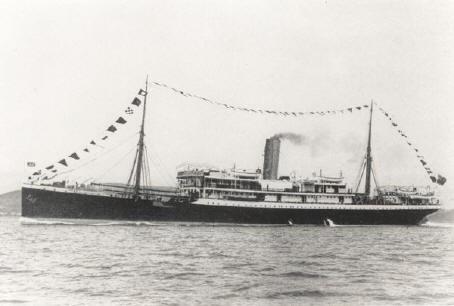
On January 16, 1917 the Mendi troopship sailed from Cape Town en route to La Havre in France carrying the last contingent of the South African Native Labour Corp comprising 805 black private, 5 white officers and 17 non-commissioned officers as well as 33 crewmembers. The SANLC comprised men who had been recruited throughout South Africa to serve as workers and labourers on war fronts but not as armed soldiers.
On the morning of 21 February 1917, another ship, the SS Darro travelling at full speed and emitting no warning signals, rammed the SS Mendi, which sank in 20 minutes. No steps were taken by the SS Darro to lower boats or rescue the survivors. She stood off and floated nearby while lifeboats from the SS Mendi's escorting destroyer, HMS Brisk, rowed among the survivors, trying to rescue them.
There are many stories of bravery about the men's bravery as the ship went down. One of them is that of the Reverend Isaac Wauchope Dyobha, who cried words of encouragement to the dying men:
"Be quite and calm my countrymen, for what is taking place now is what you came here to do. We are all going to die, and that is what we came for. Brothers, we are drilling the death drill. I, a Zulu, say here and now that you are all my brothers... Xhosas, Swazis, Pondos, Basotho and all others, let us die like warriors. We are the sons of Africa. Raise your war cries my brothers, for though they made us leave our assegais back in the kraals, our voices are left with our bodies..."
The sinking of the SS Mendi and the massive loss of life has passed into South African history as an epic and tragedy that epitomises the grief and the losses of the First World War specifically from the African perspective. There are two stories to be told, the story of the Mendi and the story of the SANLC and the service rendered in France and the injustice of a failure to recognize the military service of the black men to also volunteered. Myth and history have become muddled, while efforts to change history to redress past wrongs has some unexpected consequences.
There are several SS Mendi memorials and this lecture will visually illustrate these memorials and explain how, why and where the tragedy of the Mendi men were commemorated and memorialised.
In February 2017 we will be participating in the commemoration of the sinking of the SS Mendi. The Johannesburg Heritage Foundation will be contributing to the upgrade of the SS Mendi Memorial in Avalon Cemetery, Soweto, and will allocate all proceeds from this event to that purpose.
Hear Prof Katherine Munro speak about the tragedy of the SS Mendi, memorialization and the changing significance of commemoration.
This will be followed by a free screening of a documentary on the tragedy by film maker Marion Edmunds.
DATE: 26 November 2016
SPEAKER: Prof Katherine Munro
PARK: Northwards, 21 Rockridge Road, Parktown
TIME: 14h00
DURATION: 3 hours
COST: R100.00 for members and R150.00 for non-members
Disclaimer: Any views expressed by individuals and organisations are their own and do not in any way represent the views of The Heritage Portal.
